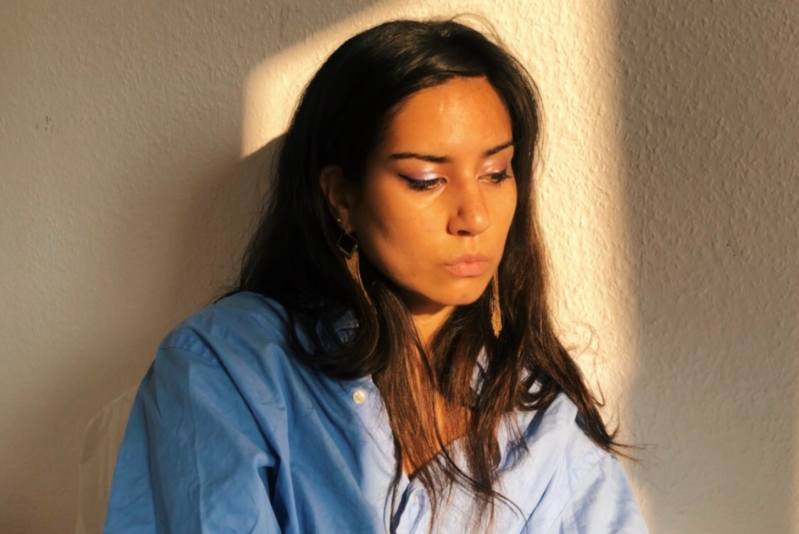Mariposa House was dead silent on Wednesday evening. Sounds of each entry and exit echoed off the wooden floors. Students clustered around the conference room, transfixed by Stegner Fellow Aria Aber’s voice; one girl sat in the corner briskly knitting a purple scarf, the clicks of her needles punctuating the quiet. Aber’s voice was low and powerful as she concluded her last poem of the night: “God, I say, my forehead kissing the flowered rug — I am not delicate. Look at me. I am not trying to disappear.” The heart-stopping tempo of that last sentence left the room reeling. The evening’s conversation, moderated by Jones Lecturer Keith Ekiss and hosted by the Creative Writing Department’s “Poetry in Conversation” series, covered topics ranging from politically conscious poetry to learning from literary canon.
Aber’s poems have appeared in The New Yorker, Poetry Magazine, Kenyon Review and The Poetry Review. Reading attendees were given free copies of her first book “Hard Damage,” which won the Prairie Schooner Book Prize in Poetry and a Whiting Award.
“This one might be my favorite of the collection,” said Aber before reading “Reading Rilke in Berlin.” She also read “Can You Describe Your Years in Prison?” “Funeral in Paris,” “Reading Rilke at Lake Mendota, Wisconsin” and “The Ownership of Naming Things” for the audience.
After the reading, Aber participated in a Q&A discussion. Aber was born in Germany to Afghani refugee parents who didn’t speak German during her early childhood. Aber herself didn’t speak the language until kindergarten, instead growing up with Farsi. Thus, the first poetry she absorbed was that of Rumi and Hafez.
“It’s a very poetic language and poetry is very important to the culture, so it was always around,” Aber said.
She described the eternal fracture between growing up in a Farsi speaking household and living in a German speaking country. “The alienation this linguistic displacement brings with itself is something I wanted to write about in my poetry,” Aber said. “Thinking of language as flexible and porous is something that poetry lends itself very well to.”
The second wave of poetry that influenced Aber included Austrian Rainer Maria Rilke, a recurring reference in her works, and German-language poets such as Johann Wolfgang von Goethe, Friedrich Schiller and Paul Celan.
“We read one of Celan’s poems, ‘The Death Fugue,’ in German class and that one changed everything for me,” Aber said. “It’s so richly textured and musical, and I just remember my teacher reading it aloud, and I was transported to a different plane of existence; it just has a completely charged frequency.”
Her multilingual background has been formative for Aber in her compositions. When writing her first book, she wrote in English, but Aber couldn’t help but wonder: why didn’t she write poetry in her “default” language of German?
“For some reason I feel more comfortable writing poetry in English, but the other languages are still in my mind. How can I bring them across with me? Something is lost when I’m thinking in just one language,” Aber said, expanding on the intentions of her poetry.
The third wave of poetry that influenced Aber was the modern American poetry, such as that of Sherman Alexie and Louise Gluck, that she studied as an undergraduate at Goldsmiths College in London.
Admiring and learning from acclaimed poets is complicated, according to Aber. Specifically, Ekiss probed her dissatisfaction with element’s of Rilke’s work; Aber’s approach to poetry is very different from Rilke’s “pure” style of writing that did not engage with his socio-political surroundings, like World War One.
Aber described how she wants to break away from the idea that the political cannot break into the lyrical. “I think that even if you’re not an activist, as a writer you should look towards what is happening in the world and what’s happening to the language around you,” Aber said.
Writing should be viewed as a conversation with elders, especially our literary ancestors, Aber explained. “Sometimes, as with parents, you can’t really choose them,” she said, touching on how we often love the works of flawed or problematic people. “Just allowing yourself the flexibility to talk back to them, or learn the craft as well as you can and then talk back to them, can be a really fruitful exercise.”
Aber’s next two projects are a poetry collection and a novel. The former deals with grief and friendship. It’s in its early stages but “grief is present on every page, for sure,” Aber said. The latter is semi-autobiographical, set in Berlin in the early 2010s, and centers a romance between a young aspiring artist and an older American architect.
“It’s about architecture, desire, love, the cold Berlin winters and the way the buildings and neighborhoods of our early years shape our imaginations,” Aber said.
